Peace
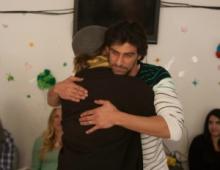
Having just gotten home from guiding another The Global Immersion Project Learning Community deep into the lives of the unheralded heroes in the Holy Land to learn from their often untold stories, I am processing emotions, thoughts, and reflections that will soon bud into a renewed set of practices at home and abroad. I have now been to Israel/Palestine quite a few times, and it would be easy to think the experience becomes mechanical or normal or whatever. Well, for me, that simply hasn’t been the case. We encourage our participants to enter the experience in the posture of a learner rather than a hero. I try to do the same, and in doing so, am continually convicted, challenged, and inspired by our remarkable friends and peacemakers embedded within this conflict.
Here are 7 learnings that have risen to the surface since landing back on home soil:

While Angry Birds has produced a massive monetary windfall over the past few years, the game has endured a significant level of controversy, especially in recent months. In January it was revealed that Angry Birds was a “leaky application,” as it was used by the National Security Agency and Government Communications Headquarters to collect private data about its users, such as residential location and sexual orientation. According to numerous online and print media investigative publications, the private user information of Angry Birds users was leaked through the application itself and collected by government authorities and private retailers for detailed analysis (under the stated purpose of research and national security). In the midst of it all, the incriminating evidence revealed that Angry Birds was a massive privacy hazard, as the Rovio Entertainment application allows the intimate details of its user identities to be stolen and even sold.

It baffles me when people who are deeply concerned about peace and peacemaking define themselves as “spiritual but not religious.” In pursuit of personal and/ or global peace, they shun organized religion in favor of indigenous spirituality. Celtic music, eastern spiritual disciplines like yoga and meditation, and the Native American relationship with nature all seem so attractive and obviously non-violent. I actually have nothing against any of those expressions of spirituality – allow me to offer as proof the trip my husband and I will be taking in July. We will be touring Northern Ireland to enjoy the “storytelling, music, art and peace” of Celtic culture “ancient and new. Great food, inspiring art, and beautiful journeys on foot will form the heart of this soulfully unique and transforming experience.” Sounds great, doesn’t it?
Normally this sort of description would not entice me. It sounds vaguely new age-y, all too “spiritual but not religious.” So why am I going? Because one of the tour leaders is my friend and brilliant cultural critic, the founder of the Wild Goose Festival, Gareth Higgins. Gareth understands that alternative forms of religiosity and spirituality are a necessary part of the revival of Christianity that is going on today, but he also understands that without “religion,” the pursuit of peace is at a serious disadvantage.
I am aware that such a claim runs counter to the primary reason many people give for being spiritual but not religious. They blame religion for violence and war, and there is no denying that many people have killed in the name of their beliefs. Somehow those who abandon organized religion believe that the cure for violence is to purge themselves of religious texts and doctrines that have any reference to violence in them. Why read the Old Testament or believe in a God who requires the death of an innocent victim to be reconciled to us? How could that possibly lead to a more peaceful world?

ONE OF THE paradoxes of writing about film is the application of one form of language to interpret another. The medium we’re discussing here is visual, and despite the relevance of the word “poetic” to the great works of cinema, to interact with the movies means, as writer-director John Sayles says, to “think in pictures.” In an age with multiple ways to consume films, and the pressure to respond with the immediacy of social media, to think deeply about movies is a countercultural act.
I noticed this again after being given a record player a few weeks ago. I’ve listened to Van Morrison’s Astral Weeks more than pretty much any other album over the past 20 years and now on the vinyl recording I can actually hear instruments I’d never noticed before. I can’t deny the superiority of the medium, at least in terms of what we might call “musical richness.” But digital transmission makes the sound crisper and more available.
There’s a parallel paradox with cinema, in that the experience of watching films has both diminished and expanded over most of our lifetimes. There are more portals than ever (you can watch Yasujiro Ozu’s Tokyo Story or Alfred Hitchcock’s Vertigo on your phone, for goodness’ sake). Yet the opportunity to see films in optimal settings (decent projection, focused audience, without 25 minutes of commercials for soda mingling with threats of prosecution directed at the people who have paid to see the film by the industrial complex that depends on them) doesn’t come often for most of us. Without conscious resistance, the flattened culture of entertainment globalization is going to continue to dominate.



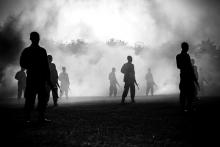
Chiamaka tells of women who plant seeds
of peace in tribal towns, pot-banging with spoons
to call men off their game of raid-and-rape.
A girl named Hope intercepts the hands
of crowing children trading blows
and coaxes them to shake their hands
although her own are quaking. At school
my shy daughter stuffs notes in friends’ lockers,
imploring playground harmony.
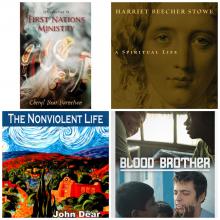
Faith and Reform
Writer and social reform Harriet Beecher Stowe’s controversial 1852 novel Uncle Tom’s Cabin brought many people to the anti-slavery movement. In Harriet Beecher Stowe: A Spiritual Life, biographer Nancy Koester illuminates the shifting role and expression of faith in Stowe’s personal and public life and work. Wm. B. Eerdmans
Falling into Love
A few years ago a young man named Rocky Braat left Pittsburgh to wander India; he’s ended up working for years in an orphanage for HIV-positive children there. His friend, filmmaker Steve Hoover, went to explore why. The result is a Sundance-award-winning documentary, Blood Brother. www.bloodbrotherfilm.com
Surely there is a mine for silver, and a place for gold to be refined ... They put their hand to the flinty rock, and overturn mountains by the roots. They cut out channels in the rocks, and their eyes see every precious thing ... But where shall wisdom be found? —Job 28:1, 9-12
THE DIRT ROAD twists down into a gully at La Puya, Guatemala, and up the other side, slipping between the knee-high fields of holy corn. The river doesn’t run anymore at the bottom, but the butterflies gather in remembrance of the water of times past. Hundreds of them rest and then flutter suddenly up as a woman goes by to gather fresh basil or chipilin from the little herb and vegetable garden that grows in tires and the ground all along the blocked access road leading into the proposed gold-mine site.
La Puya is the curve in the road where a thorn tree used to stand, throwing fine sharp needles down on unsuspecting passersby. Now it is a well-ordered encampment of neighbors from the twin municipalities of San Pedro Ayampúc and San José del Golfo, 10 miles northwest of Guatemala City.
These women and men are here in a startling act of markedly Christian peaceable resistance. They have been at the gates around the clock and around the calendar since March 2, 2012, when a lone woman pulled her car across the access road to the mine, blocking some incoming machinery. Then a bus bumping down the main road stopped, and the passengers piled off when they saw what was happening.
Then more people came, and dozens stayed. They settled in for a long night that became a long season of resistance. Local communities had had enough of the obfuscation, lies, and manipulation from Radius Gold, a mining company based in Vancouver, Canada.

Understanding the process of turning an implement of death and violence into a tool for creativity and imagination is one part of the strategy. In doing so, there is hope that participants in such an event will begin to reimagine their own world and how they engage it. After all, true change first begins with imagining the possibility of such transformation.
Further, Reyes hopes to challenge U.S. citizens to consider their relationships with guns, and moreover, the impact that value has on people in other countries. Again, in the NPR story, Reyes explains, “We have to be allowed to ask questions. If you are not allowed to ask questions, you are not free."

I was down in Mexico a few years ago for a gathering of peers who are leading faith communities around the world. It was a rich time of conversation, encouragement, and visioning.
Walking through a local Mexican neighborhood between sessions, something struck me. While those of us in the Minority World (often called the 1st or Western World) are thinking and talking about our theology, most of the folks in the Majority World (often called the 3rd World) have no choice but to simply live into their theology. Talking about our theology, faith, and practice in lecture halls, church buildings, and conference rooms is a luxury that the vast majority of Jesus followers in the world have no opportunity to participate in.
It’s not necessarily a bad thing, but it is reality. And those of us with this luxury better own up to it, because it is easy for us in the West to think we have a corner on the market of theology, which we then project (whether consciously or subconsciously) onto the rest of the world. But who's to say theology built in academia is any more valid than theology build in the realities of everyday life?
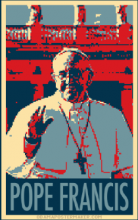
The news that President Obama will meet with Pope Francis on March 27 brightened a snowy Tuesday morning for Catholics who see a broad overlap between the president’s agenda and the pontiff’s repeated denunciations of income inequality and “trickle down” economics, and his support for the poor and migrants.
Other Catholics, especially conservatives already unsettled by Francis’ new approach, hoped that the pope would use the encounter at the Vatican to wag a finger at Obama over the president’s support for abortion rights and gay marriage.
So what will the two leaders talk about? What issues will they avoid? With Francis, anything is possible, but here are some initial ideas on how the summit could play out:
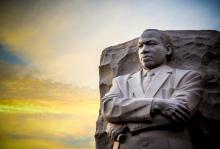
Week after bloody week, the chart of killings lengthens. And in Afghanistan, while war rages, a million children are estimated to suffer from acute malnourishment as the country faces a worsening hunger crisis.
Around this Martin Luther King, Jr. Day, we can and should remember the dream Dr. King announced before the Lincoln Memorial, the dream he did so much to accomplish, remembering his call (as the King Center asks) for nonviolent solutions to desperate concerns of discrimination and inequality within the U.S. But we shouldn't let ourselves forget the full extent of Dr. King's vision, the urgent tasks he urgently set us to fulfill on his behalf, so many of them left unfinished nearly 46 years after he was taken from us.
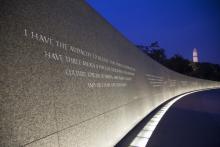
Prophets are always asking questions. Tough questions. Unsettling questions. Questions that they pose to themselves, then try to answer by how they live.
Questions such as:
What’s in our hearts? Are we concerned too much about ourselves and too little about others? Do we believe in love? Why do we give in so readily to bitterness and hatred?
Why do so few have so much, while so many have so little? Aren’t we all diminished by the poverty, discrimination, violence, and the various injustices in our world? Why do we glamorize violence and weapons as solutions to our problems?
Moriel Rothman speaks candidly about his decision to not serve in the Israel Defense Forces.

The only way to win the “war on poverty” is for liberals and conservatives to make peace — for the sake of the poor. That would be the best way to mark the 50th anniversary of the war on poverty, declared by President Lyndon Johnson in his January 1964 State of the Union address. Making peace means replacing ideologies with solutions that actually solve the problems of poverty. With both Republicans and Democrats speaking out on poverty this week, and the recession slowly receding this should be an opportunity to find the focus, commitment, and strategies that could effectively reduce and ultimately eliminate the shameful facts of poverty in the world’s richest nation.
For any proposal, the basic question must be whether it helps more people and families rise out of poverty and realize their dreams. This means setting aside political self-interest and thinking beyond our too often inflexible ideologies.
These magazine articles and blog posts published by Sojourners through the years pay tribute to the great South African leader.
SHORTLY AFTER his 1983 appointment as archbishop of San Salvador during the Salvadoran civil war, Arturo Rivera y Damas traveled to the United States. Rivera succeeded Archbishop Óscar Romero, who was martyred for his outspoken condemnation of the war. I asked a Maryknoll sister—who lost three community members, killed by the Salvadoran death squads—to assess Rivera’s comments to the U.S. media. “He does not have the gift of martyrdom,” she said.
That comment gives perspective to the efforts of nonviolent peace activists in the U.S., many of whom have risked their freedom, usually for short stints, as a consequence of civil disobedience. In Crossing the Line: Nonviolent Resisters Speak Out for Peace, Rosalie G. Riegle chronicles the action-to-court-to-jail-and-prison journeys of some of the last century’s most committed pacifists. While a few told harrowing stories, for the vast majority the consequences fell far short of martyrdom. This is not to belittle their efforts, but rather to beg the question: Why do so few Christians resist the violence and war-making of the U.S. government?
Riegle’s well-done compilation of 65 oral histories might prompt more people to step into the fray. To date, hundreds of U.S. pacifists have served hundreds of years, mostly in federal prison, for crossing lines, burning draft cards and draft files, and hammering on the weapons of war. At press time, three Catholic pacifists known as the Transform Now Plowshares—Sister Megan Rice, Greg Boertje-Obed (interviewed in Riegle’s book), and Michael Walli—await a January sentencing for federal felony charges stemming from cutting fences and hammering at the Y-12 National Security Complex in Oak Ridge, Tenn.